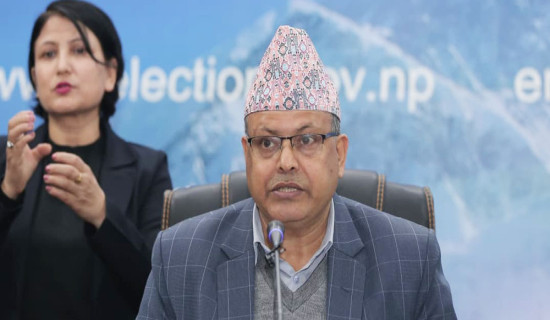- Friday, 27 February 2026
Can Trump, Putin Seal Ukraine's Destiny ?
Although the telephone conversation between US President Donald Trump and his Russian counterpart, Vladimir Putin, on May 19 failed to strike a deal on an immediate ceasefire on the Russia-Ukraine conflict, it has further bolstered personal bonhomie between the presidents of the two global powers. Ukraine and its European allies have an anathema to growing friendship between Trump and Putin, as this will give the upper hand to 'isolated' Russia in dealing with Ukraine and attaining greater legitimacy. Although Trump has not achieved his primary goal of declaring a truce, he was not frustrated following the two-hour-long talks.
On Truth Social, Trump said that Russia and Ukraine will "immediately start negotiations" toward a ceasefire and "the conditions for that will be negotiated between the two parties". Similarly, Putin disclosed that Russia advocated a peaceful settlement of the Ukrainian crisis by addressing the ‘root causes’ of the war. Before he was elected the president, Trump had claimed that he would end the Ukraine war within 24 hours of his appointment to the post. But, in hindsight, it became clear that his understanding of the Russia-Ukraine conflict was too simplistic and failed to grasp its nuances and complexities.
Business deals
Trump is a transactional leader as seen in his recent business agreements with Arab countries. And he is impatient to forge enormous trade deals with both Russia and Ukraine once the ‘bloodbath’ is over. Russia wants a conditional ceasefire that will result in lasting peace. On the other hand, Ukraine is insisting on an unconditional 30-day truce as proposed by Trump but Russia claims that such a ceasefire without a comprehensive plan will only give a chance to Ukraine to rearm and reorganise against the former. This deepening mistrust has hindered the cessation of hostilities and a temporary halt to the military operations.
Putin’s comments raise a ray of hope for peace. He said: “We agreed with the President of the United States that Russia would propose and is ready to engage with the Ukrainian side on drafting a memorandum regarding a potential future peace agreement, outlining a range of provisions, such as the principles for settlement, the timeframe for a possible peace deal, and other matters.”
Outcomes of the Trump-Putin conversation were not very encouraging for Ukraine and European leaders, as Trump does not see the role of the EU in ending the war. He said there was no need for intermediaries between Russia and Ukraine as the warring parties know details that no one else knows.' The European Union is a financier and military supplier of Ukraine, and has been demanding its participation in the peace process.
Trump’s posture must have been a rude awakening for the EU and Ukraine. ‘Ukraine is not my problem’ was Trump’s message to Europe. He told the European leaders that ‘Putin thinks he is winning the war’ and is not ready to stop now.’ According to the Financial Times, it was another victory for the Kremlin. Trump’s soft tone for Putin was not what the EU allies expected. There were no utterances of sanctions and ultimatums against Russia. This has really upset the EU, UK and Ukraine, which are moving to announce tougher sanctions against Russia for not being ready for the ceasefire.
Trump’s suggestions to hold negotiations at the initiative of the Pope show his mood of staying out of the Ukraine war. If the US takes its hands off, the EU and Ukraine may not be able to fight against the formidable war machine of Putin. It has become apparent that Russia’s economy is going strong despite numerous sanctions against it. Russia has a history of building an economy amid war that has been described as a ‘war economy.’ During the Russian Civil War (1918-1920), the term ‘war communism’ gained currency. The world’s first communist rule introduced sweeping measures to execute 'war communism'. Although it caused much hardship to the populace, the Bolsheviks eventually emerged victorious in the war of existence against their domestic foes.
The Russian side often demands that the root causes of the conflict be eliminated, stating that the West does not want to hear this. In February 2022, Russia launched a full-scale invasion of Ukraine but Russia considers the war started back in 2014 when a democratically elected pro-Russian government was overthrown in Kyiv through a 'popular coup' and with the backing of the West. Then, the enmity between the pro-West Ukrainian government and Russia grew, with Russian-speaking citizens labelled as 'disloyal elements.' The Russian authorities claim that the new Ukrainian regime started the campaign to exterminate everything that is Russian, including language, religion, symbols, mass media and culture, by codifying it into law. It is difficult to resolve the conflict and animosity that permeate at the level of language, culture and ethnicity. Another root cause of the war is the expansion of NATO at its doorstep, which Russia sees as a threat to its security and sovereignty.
Security pact
Washington is talking about "economy" more often than "sanctions". It is believed that the Putin-Trump phone call was more than a diplomatic ritual. It has further normalised US-Russia ties, opening the door for new security and trade pacts. Noted Russian thinker Aleksandr Dugin, considered the brain behind Putin, says, "Every personal conversation between Putin and Trump represents a very important step in building a new world architecture."
A few days before the Trump-Putin telephone talks, US Secretary of State Marco Rubio said that there was no military solution to the Russia-Ukraine conflict and called for a diplomatic one to end it. Rubio even promised an audit of all American aid to Ukraine, much to the chagrin of Ukrainian President Volodymyr Zelenskyy. The new US administration's distaste for military engagement is a good gesture given that it hosts around 800 military bases in over 80 countries and territories. Can the US rebuild its image as a peace-loving nation and contribute to global peace and prosperity?
(The author is Deputy Executive Editor of this daily.)

















